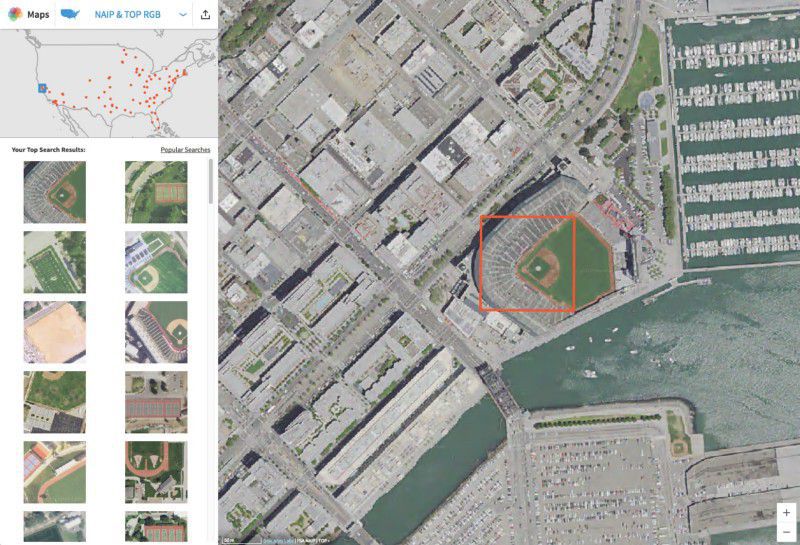copyright by www.cnet.com
Have you ever wanted to see all major swimming pools in Europe?
Want to know where all the wind and solar power supplies in the US are for some brilliant renewable-energy project? Or plot a round-the-world trip hitting every major soccer stadium along the way? It should be possible with a new tool that lets anyone scan the globe through AI “eyes” to instantly find satellite images of matching objects. Descartes Labs, a New Mexico startup that provides AI-driven analysis of satellite images to governments, academics and industry, on Tuesday released a public demo of its GeoVisual Search, a new type of search engine that combines satellite images of Earth with machine learning on a massive scale.
 GeoVisual and its potential
GeoVisual and its potential
The idea behind GeoVisual is pretty simple. Pick an object anywhere on Earth that can be seen from space, and the system returns a list of similar-looking objects and their locations on the planet. It’s cool to play with, which you can do at the Descartes site here. A short search for wind turbines had me dreaming of a family road trip where every pit stop was sure to include kite-flying for the kids. Perhaps this sounds just like Google Earth to you, but keep in mind that tool just allows you to find countless geotagged locations around the world. GeoVisual Search actually compares all the pixels making up huge photos of the world to find matching objects as best it can, an ability that hasn’t been available to the public before on a global scale.
Just fun or is there more to it?
Fun as it is, the tool also gives the public a taste of Descartes’ broader work, which so far has focused largely on agricultural datasets that can do things like analyze crop yields. “The goal of this launch is to show people what’s possible with machine learning. Our aim is to use this data to model complex planetary systems, and this is just the first step,” CEO and co-founder Mark Johnson said via email. “We want businesses to think about how new kinds of data will help to improve their work. And I’d like everyone to think about how we can improve our life on this planet if we better understood it. […]
read more – copyright by www.cnet.com


copyright by www.cnet.com
Have you ever wanted to see all major swimming pools in Europe?
Want to know where all the wind and solar power supplies in the US are for some brilliant renewable-energy project? Or plot a round-the-world trip hitting every major soccer stadium along the way? It should be possible with a new tool that lets anyone scan the globe through AI “eyes” to instantly find satellite images of matching objects. Descartes Labs, a New Mexico startup that provides AI-driven analysis of satellite images to governments, academics and industry, on Tuesday released a public demo of its GeoVisual Search, a new type of search engine that combines satellite images of Earth with machine learning on a massive scale.
The idea behind GeoVisual is pretty simple. Pick an object anywhere on Earth that can be seen from space, and the system returns a list of similar-looking objects and their locations on the planet. It’s cool to play with, which you can do at the Descartes site here. A short search for wind turbines had me dreaming of a family road trip where every pit stop was sure to include kite-flying for the kids. Perhaps this sounds just like Google Earth to you, but keep in mind that tool just allows you to find countless geotagged locations around the world. GeoVisual Search actually compares all the pixels making up huge photos of the world to find matching objects as best it can, an ability that hasn’t been available to the public before on a global scale.
Just fun or is there more to it?
Fun as it is, the tool also gives the public a taste of Descartes’ broader work, which so far has focused largely on agricultural datasets that can do things like analyze crop yields. “The goal of this launch is to show people what’s possible with machine learning. Our aim is to use this data to model complex planetary systems, and this is just the first step,” CEO and co-founder Mark Johnson said via email. “We want businesses to think about how new kinds of data will help to improve their work. And I’d like everyone to think about how we can improve our life on this planet if we better understood it. […]
read more – copyright by www.cnet.com
Share this: